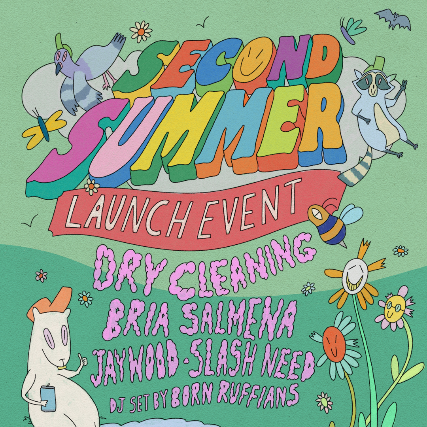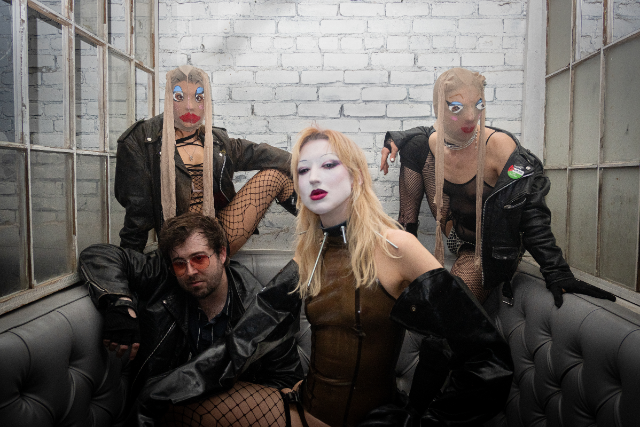TICKET SALES TERMINATED
Tickets are currently unavailable on TicketWeb

Second Summer Festival Presents
Second Summer Festival Launch Event
Wed, 24 September
Doors open
7:00 PM EDT
Lee's Palace
529 Bloor Street West, Toronto, ON M5S 1Y5
TICKET SALES TERMINATED
Tickets are currently unavailable on TicketWeb
Description
Second Summer is a brand new music festival in Toronto’s West End — built by music people, for music people. In a time when algorithms decide what we hear, we’re bringing music discovery back to real life. No scrolls, no hype, just great artists doing what they do best. This isn’t about chasing trends — it’s about soul, community, and putting independent talent front and centre. Because we missed this. Because the scene needs this. And because the best music still starts small.
Event Information
Age Limit
19+
Capacity
600

Post-Punk
Dry Cleaning
Dry Cleaning
Post-Punk
As soon as Dry Cleaning finished their debut album New Long Leg – critically acclaimed across the board and number four in the UK album charts – they immediately set about moving fowards. Having already started writing their second record before their first was released, they proposed to producer John Parish that they spend twice as much time on the follow-up, Stumpwork.
Listen to the album and you can feel that increased boldness - vocals which coil tightly around deft and complex riffs, great meshes of instrumental texture and the willingness to launch into full-on abstraction. It is a heady mix that is entirely Dry Cleaning’s own, distinguishing from their contemporaries. “We felt more confident,” says guitarist Tom Dowse. “We could see the bigger picture and knew where to focus our energy more efficiently.”
Before recording they rehearsed for two days at Bristol’s Factory Studios with Parish and engineer Joe Jones, building on the forward-thinking relationship they’d established during New Long Leg. “When you perform in front of any audience it makes you think differently,” says drummer Nick Buxton. “The cracks show clearer, but the strong elements shine through.” When they met up with Parish again, this time at Rockfield Studios, they’d purposely left gaps to allow for further exploration there. “We consciously wanted to make the songs much richer in parts and we were keen to explore more space, using ambience and atmosphere to be a greater dynamic,” says Dowse.
The breadth of influences on Stumpwork is dizzying, a definitive rebuke to those who might reduce Dry Cleaning as a post punk band. On ‘Don’t Press Me’ they take their cues from Guided By Voices – a song less than two minutes long but loaded with melodious hooks. Their blend of jangle and noise is in the tradition of cult indie bands like Black Tambourine, The Field Mice and Stephen, while enveloping ambient sections draw on great experimentalists like Kim Gordon and Bill Nace’s Body/Head, Loren Connors and Roy Montgomery. They also cite the likes of Stephen Malkmus’ Pavement and their ‘90s slacker contemporaries Polvo, particularly on the irresistibly languorous ‘Driver’s Story’. On the whacked-out and otherworldly ‘Anna Calls From The Arctic’ the group are inspired as much by ESG’s spartan punchiness as they are the acclaimed composer John Barry.
Frontperson Florence Shaw demonstrated increased spontaneity in the studio, improvising many of her lyrics straight on to the album. Of the words written beforehand, almost the entirety were observational. Much was written on “four or five short walks around London and Bristol, and at a flea market where I wrote a lot of the lyrics to ‘Hot Penny Day’, recording myself or writing things down, inventing stories from things I saw.” There is one quote from the artist Maggi Hambling on the woozy title track, text from an old Macintosh computer virus on ‘Don’t Press Me’, and snippets from the press cuttings library of archivist Edda Tasiemka scattered throughout, but the use of ‘found lyrics’ employed in the band’s early years is now far in the past.
“I wrote about the things that preoccupied me over this period, like loss, masculinity, feminism, my mum, being separated from my partner for little stretches in the lockdown, lust,” she continues, preoccupations from which wider political and social commentary emerges. “I think if you make something observational, which I think I do, it’s political,” Shaw says. “There were two murders of women in London that were extensively covered on the news, and the specific details of one of those murders were reported on whilst we were at Rockfield. That coverage influenced some of my writing and my state of mind.” The band’s instrumentation, too, may well reflect our increasingly bleak socio-political landscape, the way it can pick up intense and urgent momentum, or zone out into icy detachment. “I do think these things seep into the music if you’re an observant person, even unconsciously,” says Dowse, “and surely no one can ignore the severity of the degradation we’ve witnessed in the past few years.”
The band’s loss of a number of loved family members over the last year would also have an impact on Stumpwork. Among them was bassist Lewis Maynard’s mother Susan, at whose home the band rehearsed in their early days, the location of which inspired the name of their debut EP Boundary Road Snacks And Drinks. “It was a carefree environment that I hadn’t felt since my teens and these experiences became the foundation of our project,” remembers Buxton. On the day that the band appeared on Later With Jools Holland, she was in hospital and unable to receive visitors due to coronavirus restrictions. “It felt special that what we had achieved from the first record, could still entertain her and communicate with her while no one could see her,” says Maynard. New Long Leg was released a week before she passed away, so she was able to see it reach number four in the charts. “The success of the band became a distraction for the whole family while grieving. And it gave even more importance to what we are doing,” Maynard adds.
Stumpwork was made in the aftermath – they were in the studio writing the day before Susan died – but from their grief they found fuel for the record’s most joyous elements. “I see the album as a celebration of what she gave us and a reflection of how fortunate we were to know her,” says Buxton. Dowse also lost his grandfather who was extremely proud of the band’s success. “It’s of course devastating to lose close family members but their legacy in Dry Cleaning is wholly positive,” he says. “The moments in the songs which are upbeat and joyful made me think of them both the most.”
Ultimately, what defines Dry Cleaning’s second album is the breadth of its scope. Their music is bolder and more expansive, Shaw’s lyrics explore not only loss and detachment but all the twists and turns, simple joys and minor gripes of human experience too; she narrates an off-kilter conversation with a distant friend (‘Anna Calls From The Arctic’), the travails of a beloved family tortoise (‘Gary Ashby’), or the giddy thrill of getting ready to see otters (‘Kwenchy Kups’) with the same attention as anything else. Ultimately, what emerges from it all is a subtle but assertive optimism, and a lesson in the value of curiosity. As Shaw sings on ‘Kwenchy Kups’, “Things are shit, but they’re gonna be OK.”

Post-Punk
Bria Salmena
Bria Salmena
Post-Punk
Bria Salmena’s Big Dog chronicles a story of transformation–a deeply personal exploration of
resilience and a declaration of artistic independence forged through collaboration. Long celebrated as
the frontwoman of Canadian post-punk outfit FRIGS and as a vocalist in Orville Peck’s live band,
Salmena culminates her artistic evolution on her debut solo album. Anchored by her commanding
voice—alternately tender, raw, and defiant—the album traverses the terrain of vulnerability and
connection, marking the arrival of an artist boldly coming into her own.
Big Dog is a record of big emotions and big ambitions. Musically, the record takes elements of hypnotic
krautrock and shimmery shoegaze, opulent goth, and pulsing darkwave, with a smearing of electronic
textures for a sophisticated and often uncanny sound. Amidst this vast sonic landscape, Salmena’s
potent lyrical imagery and gorgeous vocals stand dead center, perfectly in focus.
For Salmena, it is impossible to unlink the personal journey represented by Big Dog from the
collaborative relationships that went into its creation. Salmena worked with producer and multiinstrumentalist Duncan Hay Jennings in both FRIGS and Orville Peck’s band. Jennings, who is not
only Salmena’s closest creative collaborator but also her closest friend, wrote Big Dog with Salmena
over several years, during which Salmena was based in LA and Jennings in Toronto. Before Big Dog,
the two gave classic and modern Americana songs a goth-y dream pop treatment on Salmena’s
Cuntry Covers EPs.
Graham Walsh (Holy F**k, METZ, Debby Friday, Alvvays) helped the pair further refine their budding
mix of rock and electronic music, while Meg Remy (of critically acclaimed experimental pop project
U.S. Girls) focused primarily on Salmena’s vocals. Remy helped coax out the unforgettable
performances that lie at the center of Big Dog through a series of cathartic meetings, pushing Salmena
to dig even more deeply into the meaning of her lyrics and really think about different ways of using
her voice. As Big Dog came together, it became apparent that Salmena’s songwriting had taken a raw
and intimate turn, going well beyond her and Jennings’ work on their prior EPs.
Big Dog’s sound hovers between two worlds, gritty punk honesty always simmering below gleaming
atmospherics, impossible to ignore. There are alternative rock touchstones—you’ll hear Live Through
This, Kate Bush, Mazzy Star —and one genuine alternative rock icon in Lee Ranaldo, who contributes
guitar to "See'er.” But there’s also a sleekness that’s just as much a callback to ‘80s coldwave as it is
to ecstatic forms of dance music. Salmena’s rich voice is ever-present, a constant warm glow within
a mesh of mechanical sounds. At its core, Big Dog is more than just a record about discovering who
you are by processing painful experiences. It’s a record about discovering that you are never really
alone

Alternative
JayWood
JayWood
Alternative
JayWood is the enigmatic, artistic outlet for boundary-pushing musician and singer-songwriter Jeremy Haywood-Smith. JayWood fluidly navigates the blurred lines between genres such as Alternative Hip-Hop, Indie, and Neo-Soul—all territory where he feels completely at home. This is evident in his self-produced Polaris Music Prize nominated album "Slingshot" (2022) and the follow-up EP "Grow On" (2023), which, combined, garnered praise from KEXP, KCRW, CBC, Paste, FLOOD, Exclaim!, The FADER, among others, and saw him performing at international festivals such as SXSW, The Great Escape, and Reeperbahn. As displayed on the recently released, genre-blending singles "BIG TINGS" feat. Art-pop duo Tune-Yards and "UNTITLED (Swirl)," JayWood can't be pigeonholed, and his upcoming single "ASSUMPTIONS" is no exception to that rule. As trippy and in-your-face as the forthcoming album (September 2025), the hip-hop production here is laced with psychedelic flourishes and braggadocious, neo-soul energy, owing as much to Tyler, the Creator as it does Stereolab and indie darlings Men I Trust.

Dance/Electronic
Slash Need
Slash Need
Dance/Electronic
A confrontational, camp and seductive
dramaturge. Toronto’s industrial performance
art outfit Slash Need have earned a reputation
for putting on high-energy theatrical live
performances. The group craft songs that
slither, satirize, and scream. Served up raw,
Slash Need’s distinct style of propulsive techno
and metallic darkwave serves as the backdrop
to an unpredictable, ever-changing, and
communal performance piece.
Following a viral bout of unplanned, and
gratifying, attention from right wing media in
2023 after their lore-making performance at
Toronto Pride, the group has developed a cult
following. (A widely-circulated video earned 2.3
million views with one comment calling the
group ”nasty, filthy perverts”.) Conjuring the
essence of cherry red lipstick smudged on the
rim of a spilled energy drink, baby powder
masquerading as Chanel perfume;
pheromones, smoke machines, and crossed
wires, Toronto’s Slash Need is an invitation:
demanding that we blur the line between
repulsion and desire, to arrive at a fierce
reclamation of personal autonomy.
We have released three EPs, two singles and
one video album. Our first full length album, “Sit
and Grin” is forthcoming this fall.